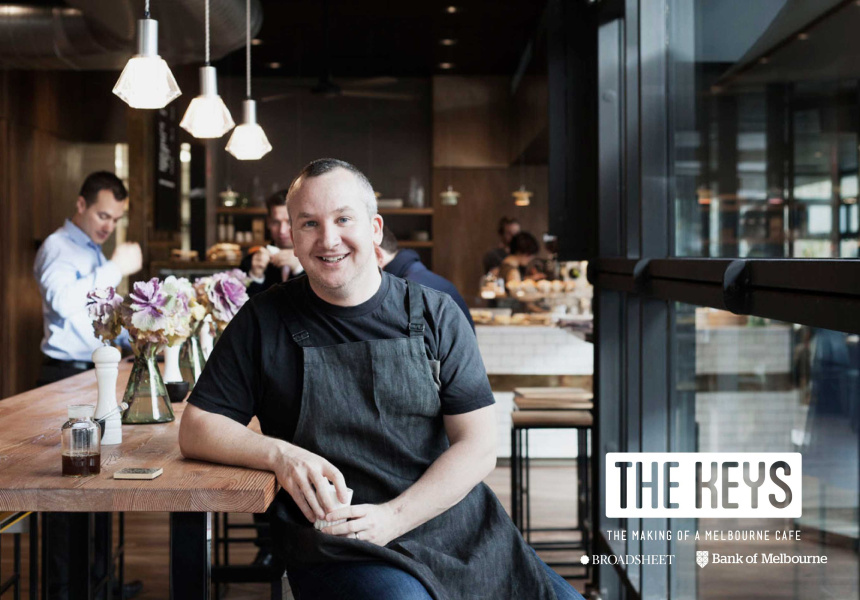Currently at the helm of three successful Melbourne venues (and counting), Nathan Toleman has become renowned in the Melbourne cafe scene for steering a steady ship. Since opening his first venue, Liar Liar, in 2006, Toleman has opened Apte, Three Bags Full and Two Birds One Stone, all of which have become well known for being very busy, very efficient venues. His latest project, Richmond’s Top Paddock, is perhaps the biggest, busiest and most efficient of them all. “When we design a space, we think of it from the customer’s point of view and the worker’s point of view as well,” says Toleman. “The customers have more fun if the staff are having fun, and the staff have more fun if they feel like they’re in control.”
“It’s been a lifetime of learning I guess,” says Toleman. After finishing year 12, he studied hospitality management at the William Angliss Institute, then spent a few years working in hospitality and hotels in various roles. After a spell teaching English in Japan and a few years working with a shop fitting company, Toleman was ready to open his own venue.” It was a pretty good combination of having a chef as a wife and studying hospitality,” he says, “so it was a pretty obvious thing to do.”
For The Keys, we chose Toleman as one of four industry leaders that we think have shaped the Melbourne food and drink landscape. Along with Kate Bartholomew (Coda, Tonka), Chris Lucas (Chin Chin, Baby) and Vanessa Hastie from Bank of Melbourne, Toleman helped sort through the final entries to select Andrew Kelly as the recipient of the invaluable program of mentoring in the path to opening his new venue. “I’ve been really fortunate to have been involved in this industry for almost 20 years now and I would’ve loved to have been able to rely on someone’s mentoring and advice in the early days,” says Toleman. “A chance to work with Andrew or any of the other applicants is great for me, because I can learn off them as well as them learning from me.”
We think you might like Access. For $12 a month, join our membership program to stay in the know.
SIGN UPFollowing his recent meeting with Andrew Kelly for our latest installment of The Keys video series – Smooth Operations, we asked Nathan Toleman to let us in on some of the lessons he’s learned along the way on how to run a smooth and successful cafe venue.
- Nathan's top 5 tips for smooth operations and supply
1. The less steps, the better.
We try to make dishes with three to five steps at the max. Any more than that and it just puts too much pressure on the kitchen and pushes the wait time up. On a busy weekend in a Melbourne cafe, you can wait 30 minutes just for your food, but we’ve been able to get that down to 15-20 minutes. It’s a really important factor; not only in providing a good experience for the customer, but it helps with your productivity, because you can turn over the tables quicker. It benefits the customer as much as the business.
2. Ratios on the floorplan
It’s a natural thing you do when you’re starting a business – you try and look at how you can get as many seats in as you can, but there’s no point in having them if the kitchen can’t accommodate that many customers. We’ve learnt it’s better to reduce your number of seats and increase your kitchen space to be at least 20% of the floorplan. It might sound excessive but it makes the operations so much smoother. We’ve designed the kitchen so there’s a central pass – it’s a bit more like a restaurant I suppose, not a traditional one. It lends itself to food being able to be cooked a lot quicker and for communication between the chef and the floor staff.
3. Ratios on the wait staff
I’ve worked as a waiter so I know the extremes. We try to keep it to around 30 customers to every waiter; it provides a good level of service. We always have a manager on as well to act as a second pair of eyes and hands for our waiters whenever they need it.
4. Build a great team
A great chef is key. We want chefs that can provide food that is a little bit of a twist on an everyday favourite, but it needs to be relatable to people - not too boring either. A good chef is really important, but I wouldn’t say they’re any more important than a good waiter or a good barista. It’s a real team effort and that’s something we’ve focused on – developing a team that’s strong on all levels.
5. Suppliers
We directly contact growers and work with them, so you don’t just know where they came from, but who grew them. There’s a real emphasis on people knowing where their coffee comes from, so we look at it the same with produce. We have people all over Australia growing avocados for us, we get cheese made for us down in Red Hill. If you look after them, they’ll look after you. They’ll call you and say, you know, ‘we’ve got some great prawns on the boat right now, do you want some?’ There’s no reason to buy frozen or refrigerated food – it’s just not necessary.
The Keys is brought to you by Broadsheet and Bank of Melbourne.

